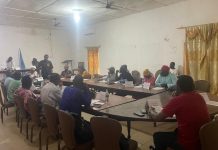By Momodou Jarju
The plenary of the National Assembly (NA) has rejected a proposal from the Standing Committee on Human Rights and Constitutional Matters to delete clause 57 in the Criminal Offences Bill 2020.
They rejected the proposal during the consideration stage of the aforementioned bill recently.
The standing committee opined that clause 57 violates the principle of fundamental rights and freedoms. Dubbed “Wrongfully inducing a designated boycott”, the clause has 10 sub-clauses and 14 paragraphs.
Sub-clause one of clause 57 reads:
“(1) Whenever the President is satisfied that a boycott is being conducted or is threatened or is likely to be conducted in The Gambia with the intention or effect of-
(a) bringing the economic life of The Gambia into jeopardy; or
(b) raising discontent or disaffection amongst the people of The Gambia or engendering feelings or ill-will or hostility between persons of different classes or religions or of different races or tribes in The Gambia,
and he or she is satisfied that the boycott is resulting, or is likely to result, in acts leading to violence or intimidation or the destruction of or damage to property or trade, he or she may, by notification published in the Gazette, designate that boycott for the purposes of this section.”
“What’s the problem?” inquired NA Speaker Hon. Fabakary Tombong Jatta, quizzing the committee to explain the reason for their proposition. Jatta was the chairperson of the plenary and thus can participate in the session.
“The problem is people have a right to boycott,” replied Hon. Suwaibou Touray, the vice chairperson of the aforesaid committee.
Jatta probed: “To boycott for the purpose of bringing economic life to a halt?”
“No, no, you know you are the one who is putting those connotations there. What I’m saying is people have a right to boycott, and if they are going to boycott, then they have to speak to each other to boycott. So if you criminalise all that, that is infringing on their rights to even communicate with each other,” Touray said.
But Hon. Jatta disagreed. He informed lawmaker Touray that every right has a limit.
“There is no absolute right anywhere,” he added.
Hon. Touray argued that it’s their responsibility to come up with good laws and for him, clause 57 is a bad law because it infringes on people’s rights to boycott.
Member for Foni Bintang Hon. Bakary Badjie opined that the court ought to determine whether a boycott causes threat to the country’s security or brings economic life to a halt and not the President.
But Speaker Jatta believes on the contrary. He said Gambians elected the President to lead the country and the onus is on the President to make such decisions.
“If he is not doing it right, parliament has a right of oversight over him. Or people have a right to resort to the court for determination of certain issues,” he said.
Majority leader and member for Kantora Hon. Billay G. Tunkara said the clause in question also seeks to address discontent among people which could result to violence and or intimidation, leading to destruction.
For instance, he said, it would be illegal for someone to tell the transport union not to commute the traffic in a bid to create disaffection and incur people’s anger towards the government.
“So therefore this [clause] is very important to be there. We have respected your proposal, but we are saying it’s relevant to be there,” he told the standing committee.
“Gov’t Not Criminalising Boycott”
Responding to the concerns raised by the standing committee, the Attorney General and Minister for Justice Hon. Dawda A. Jallow said the clause is not new in Gambian laws, saying it’s Clause 59(a) in the existing Criminal Code.
On the concern raised on the President determining whether the boycott is a threat to the country and its people, Minister Jallow said the President is well advised because he has the entire machinery of government at his disposal.
“So we cannot say if the President is going to take a decision, that individual taking a decision, no! It’s somebody heading a government with ministries and all the apparatus of the state at his disposal,” he said.
Minister Jallow agreed with Wuli East lawmaker Hon. Touray that boycott is not an offense, which is a general rule. But he cited an example to elucidate the matter better for the lawmakers to comprehend.
“If all the Fulas who are baking bread just wake up one morning and say they will not sell bread to Joolas, that kind of boycott is wrong. It can be designated as a forbidden kind of boycott, for example.
“So you are not criminalising boycotts generally but if a particular boycott is discovered and advised by government that this particular kind of boycott if it is left to continue may cripple the economy or may bring instability, religious or tribal or whatever, then government will designate that kind of boycott and prohibit it. Then after the designation in the Gazette, if you do it, then you commit the offense. That’s what this clause is trying to do here. And I think it’s fair,” he said.
About the Criminal Offences Bill
The bill seeks to align the country’s criminal justice legislation with current trends by removing all provisions inimical to freedom of speech such as criminal defamation and sedition among others.
The bill was presented before lawmakers for the first reading on June 22, 2020. It was read for the second time on July 13, 2020 where it was referred to the aforementioned standing committee for scrutiny and report back to the plenary, which was done on Monday December 4, 2023 when the august assembly adopted the committee’s report.
The plenary session was chaired by the speaker, Hon. Fabakary Tombong Jatta. The plenary was supposed to scrutinise every clause and schedule in the bill, as well as proffer amendments to be debated and voted on. But they couldn’t complete the over 300 clauses earmarked for consideration on Monday March 11, 2024. Only 87 clauses were completed! The consideration stage has now been adjourned until further notice.





















